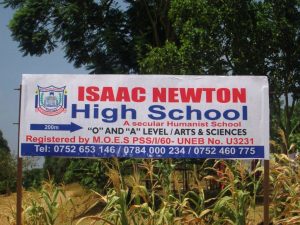 Isaac Newton High School in Uganda has been working on projecting the Humanist Ethos of the school to the local community and to visitors. It has a new school sign, which proclaims its Secular Humanist stance.
Isaac Newton High School in Uganda has been working on projecting the Humanist Ethos of the school to the local community and to visitors. It has a new school sign, which proclaims its Secular Humanist stance.
Peter Kisirinya, the Director of Isaac Newton School, explains that, “The active executive committee of our Humanist Students Association is planning voluntary activities around the school community this coming term that will involve improving sanitary conditions, teaching local people about disease prevention especially Malaria and HIV/AIDS and educating them about family planning methods“.
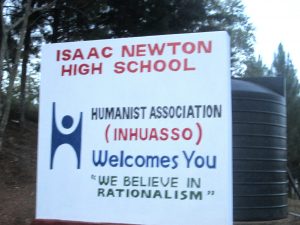 The students decided to use part of the money from a small grant from UHST to create signs to proclaim their Humanist Association. As you walk or drive up to the school gate, visitors are greeted by a welcome sign saying “We believe in rationalism“, and there is a similar sign wishing them a safe journey as they leave the school. On the school campus visitors will see a sign which proclaims in Luganda the Humanist commitment to self help. Invoking the spirit of an old Baganda saying:
The students decided to use part of the money from a small grant from UHST to create signs to proclaim their Humanist Association. As you walk or drive up to the school gate, visitors are greeted by a welcome sign saying “We believe in rationalism“, and there is a similar sign wishing them a safe journey as they leave the school. On the school campus visitors will see a sign which proclaims in Luganda the Humanist commitment to self help. Invoking the spirit of an old Baganda saying:
“Baganda Nkoba Za Mbogo- literally saying that “people from Buganda must strive on their own to get out of problems” – much as ropes cut from the skin of a dead buffalo are used to pull out a live buffalo found trapped in a pit.”
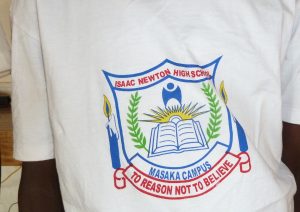 The school T-shirts (right) bears the school’s motto “To Reason not to Believe“.
The school T-shirts (right) bears the school’s motto “To Reason not to Believe“.
Following the very successful Humanist Ethos Project in 2015, all three Humanist Schools have been working to make the schools distinctive from the religious schools around them.
They now work to a common set of school rules in which the disciplinary code rejects violence in favour of guidance. Individual responsibility is encouraged and school conduct is based upon the promotion of an empathetic approach towards others. Guidelines have been agreed for the conduct of lessons to encourage students to become independent and autonomous learners, foster mutual respect among teachers and students and to encouraged a child-centred approach to learning. All three schools now expect new teachers to sign a pledge that they subscribe to this common understanding. Each school has appointed a Humanist Counsellor, whose job is to monitor and develop each school’s Humanist Ethos.
Humanist Student Associations, which have been set up in each school, encourage students to take part in activities that foster care for individuals and the wider community. Led by Robert Bwambale, the Director of Kasese Humanist Primary School, the schools have designated a set of special days where they celebrate important landmarks contributing to a better world, such as: World Environment Day, World Humanist Day, World Food Day, Darwin Day, World AIDS day, United National Day. At Kasese and Mustard Seed School the initial focus of the students association has been to work together to improve nutrition within the school by embarking on projects to rear chickens in order to increase the amount of protein in the diet of students – they see this as an example of self-help directed towards making things better for the wider student community as well as promoting the knowledge and skills of animal husbandry.
UHST very much welcomes these initiatives and we hope to be able to continue to provide some funds each year to help the student Humanist associations to develop into vibrant and attractive elements of school life, which help to draw each school closer to its local community.
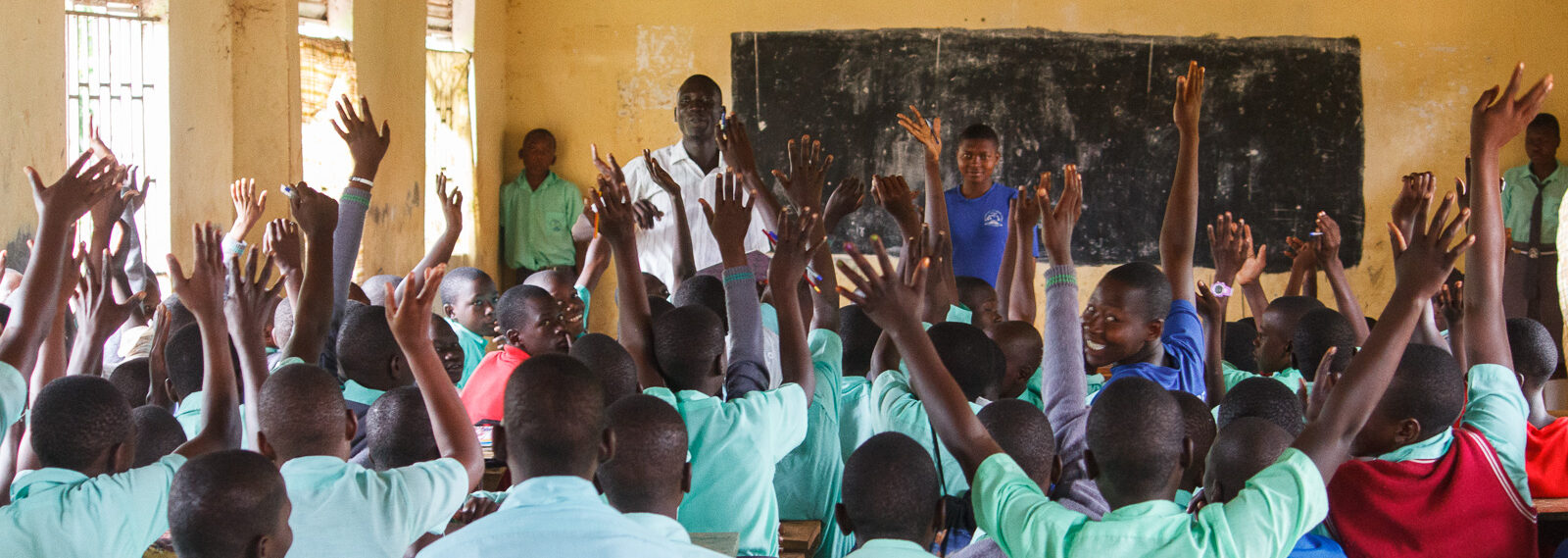
Posted: March 10, 2017 by Steve Hurd
A-Level Breakthrough at Mustard Seed
This follows the steady improvement in O-level School Certificate results in recent years, which has encouraged more students to stay on at school for A-level study.
Out of 16 students entered for A-levels at the end of 2016, all but one student gained at least two A-levels – the minimum requirement to move on to Higher Education courses. With two A-levels students are eligible for further academic study but also for a variety of vocational courses including: training for nursing and medical ancillary occupations, teaching (especially at primary level), agricultural college and technical training, such as motor vehicle mechanics, plumbers, electricians.
8 students, 4 boys and 4 girls, gained 3 A-levels, which is a huge achievement for a small rural school. This will enable the students to move on to good universities if they can secure funding. Competition for full government scholarships on academic courses is tight and probably none of the students have the grades required for this. Students training as nurses and teachers are usually eligible for state support, but others, who find it a struggle to fund further courses, should be able to find better jobs in the labour market than would have been possible without their qualifications.
Posted: February 28, 2017 by Steve Hurd
Humanist school’s Community Service Volunteer Programme
They went to the homes of 8 needy families, 5 of whom have students at Isaac Newton High school on scholarships for bright but needy children. They worked to improve pit latrines which were in very sorry state; many were almost collapsing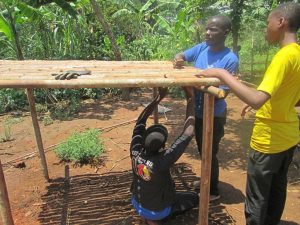 and others were full to overflowing. Most of the latrines, which had tree logs as the floor, were rotting and cracking and generally found to be in very sorry and dangerous situation as you can see from some pictures. The programme involved constructing new covers on the pit latrines.
and others were full to overflowing. Most of the latrines, which had tree logs as the floor, were rotting and cracking and generally found to be in very sorry and dangerous situation as you can see from some pictures. The programme involved constructing new covers on the pit latrines.
The students did some other work around the home, including:
The volunteers also visited the local primary school to encourage the children to enrol at Isaac Newton School, when they complete their primary schooling.
Some local families were found to comprise very elderly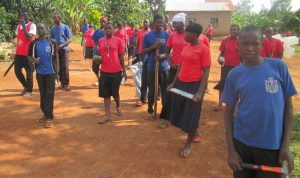 grannies taking care of very young grand children, whose parents had died or gone away for work. The volunteers hope to be able to help families like these and others in future. The volunteering activities will be done on Sundays when the other Christian members of the school attend prayers.
grannies taking care of very young grand children, whose parents had died or gone away for work. The volunteers hope to be able to help families like these and others in future. The volunteering activities will be done on Sundays when the other Christian members of the school attend prayers.
Also, last Sunday, there was a second general meeting of the new Isaac Newton Community Based Organisation. The purpose of this meeting was to share expertise in order to plan for the new planting season. It was agreed to use a room in the reception house near the school gate as a farmers shop, where farm inputs will be bought in bulk from wholesalers and sold to members at cost price. This will reduce substantially the cost of farm inputs, such as fertilisers, seed and stock food, and help to raise productivity on the local farms.
for the new planting season. It was agreed to use a room in the reception house near the school gate as a farmers shop, where farm inputs will be bought in bulk from wholesalers and sold to members at cost price. This will reduce substantially the cost of farm inputs, such as fertilisers, seed and stock food, and help to raise productivity on the local farms.
Peter Kisirinya
Director, Isaac Newton High School
Posted: February 16, 2017 by Steve Hurd
Isaac Newton High School proclaims its Humanism
Peter Kisirinya, the Director of Isaac Newton School, explains that, “The active executive committee of our Humanist Students Association is planning voluntary activities around the school community this coming term that will involve improving sanitary conditions, teaching local people about disease prevention especially Malaria and HIV/AIDS and educating them about family planning methods“.
“Baganda Nkoba Za Mbogo- literally saying that “people from Buganda must strive on their own to get out of problems” – much as ropes cut from the skin of a dead buffalo are used to pull out a live buffalo found trapped in a pit.”
Following the very successful Humanist Ethos Project in 2015, all three Humanist Schools have been working to make the schools distinctive from the religious schools around them.
They now work to a common set of school rules in which the disciplinary code rejects violence in favour of guidance. Individual responsibility is encouraged and school conduct is based upon the promotion of an empathetic approach towards others. Guidelines have been agreed for the conduct of lessons to encourage students to become independent and autonomous learners, foster mutual respect among teachers and students and to encouraged a child-centred approach to learning. All three schools now expect new teachers to sign a pledge that they subscribe to this common understanding. Each school has appointed a Humanist Counsellor, whose job is to monitor and develop each school’s Humanist Ethos.
Humanist Student Associations, which have been set up in each school, encourage students to take part in activities that foster care for individuals and the wider community. Led by Robert Bwambale, the Director of Kasese Humanist Primary School, the schools have designated a set of special days where they celebrate important landmarks contributing to a better world, such as: World Environment Day, World Humanist Day, World Food Day, Darwin Day, World AIDS day, United National Day. At Kasese and Mustard Seed School the initial focus of the students association has been to work together to improve nutrition within the school by embarking on projects to rear chickens in order to increase the amount of protein in the diet of students – they see this as an example of self-help directed towards making things better for the wider student community as well as promoting the knowledge and skills of animal husbandry.
UHST very much welcomes these initiatives and we hope to be able to continue to provide some funds each year to help the student Humanist associations to develop into vibrant and attractive elements of school life, which help to draw each school closer to its local community.